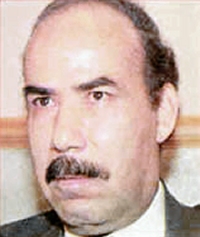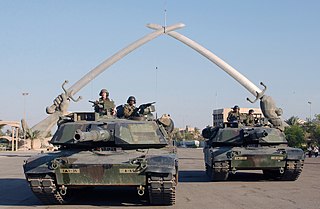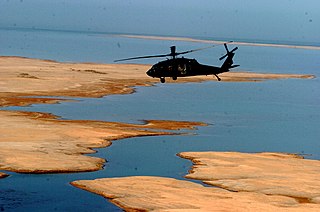
The Islamic Supreme Council of Iraq is a Shia Islamist political party in Iraq. It was established in Iran in 1982 by Mohammed Baqir al-Hakim and changed its name to the current Islamic Supreme Council of Iraq in 2007. Its political support comes from Iraq's Shia Muslim community.

Barzan Ibrahim Hassan al-Tikriti, also known as Barazan Ibrahim al-Tikriti, Barasan Ibrahem Alhassen and Barzan Hassan, was one of three half-brothers of Saddam Hussein, and a leader of the Mukhabarat, the Iraqi intelligence service. Despite falling out of favour with Saddam at one time, he was believed to have been a close presidential adviser at the time of his capture by U.S. forces. On 15 January 2007, Barzan was hanged for crimes against humanity. He was decapitated by the hangman's rope after errors were made calculating his body weight and length of drop from the platform.

The occupation of Iraq was characterized by a large United States military deployment on Iraqi territory, beginning with the US-led invasion of the country in March 2003 which overthrew the Ba'ath Party government of Saddam Hussein and ending with the departure of US troops from the country in 2011. Troops for the occupation came primarily from the United States, the United Kingdom, and Australia, but 29 other nations also provided troops, and there were varying levels of assistance from Japan and other countries, as well as tens of thousands of private military company personnel.

The following is a timeline of major events during the Iraq War, following the 2003 invasion of Iraq.

Ayatollah al-Sayyid Muhammad Baqir Muhsin al-Hakim at-Tabataba'i, also known as Shaheed al-Mehraab, was a senior Iraqi Shia Islamic Scholar and the leader of the Supreme Council for Islamic Revolution in Iraq (SCIRI). Al-Hakim spent more than 20 years in exile in Iran and returned to Iraq on 12 May 2003. Al-Hakim was a contemporary of Ayatollah Khomeini, and The Guardian compared the two in terms of their times in exile and their support in their respective homelands. After his return to Iraq, al-Hakim's life was in danger because of his work to encourage Shiite resistance to Saddam Hussein and from a rivalry with Muqtada al-Sadr, the son of the late Ayatollah Mohammed Sadeq al-Sadr, who had himself been assassinated in Najaf in 1999. Al-Hakim was assassinated in a bomb attack in Najaf in 2003 when aged 63 years old. At least 75 others in the vicinity also died in the bombing.
Baqubah is the capital of Iraq's Diyala Governorate. The city is located some 50 km (31 mi) to the northeast of Baghdad, on the Diyala River. In 2003 it had an estimated population of some 467,900 people.
Events in the year 2004 in Iraq.

Ayad Allawi is an Iraqi politician. He served as the vice president of Iraq from 2014 to 2015 and 2016 to 2018. Previously he was interim prime minister of Iraq from 2004 to 2005 and the president of the Governing Council of Iraq in 2003.

Jama'at al-Tawhid wal-Jihad, abbreviated as JTJ or Jama'at, was an Islamic extremist Salafi jihadist terrorist group. It was founded in Jordan in 1999, and was led by Jordanian national Abu Musab al-Zarqawi for the entirety of its existence. During the Iraqi insurgency (2003–11), the group became a decentralized network with foreign fighters with a considerable Iraqi membership.

After the invasion of Iraq was completed and the regime of Saddam Hussein was toppled in May 2003, the Iraqi insurgency began. The 2003–2006 phase of the Iraqi insurgency lasted until early 2006, when it escalated from an insurgency to a civil war, which became the most violent phase of the Iraq War.
Events in the year 2005 in Iraq.

The Iraqi Accord Front or Iraqi Accordance Front also known as Tawafuq is an Iraqi Sunni political coalition created on October 26, 2005 by the Iraqi Islamic Party to contest the December 2005 general election. As a large section of Iraq's Sunnis are composed by the populous Kurds, situated in northern Iraq and locally autonomous, the party's members are mostly Arab, and as such, its political efforts have largely been focused on protecting this community's interests as opposed to Iraq's non-Sunni population. In the 2005 election, its platform called for ending the US occupation of Iraq, revision of the new Iraqi constitution, repeal of the de-Ba'athification laws that had cost many Sunnis their government jobs and the restoration of the Iraqi Army, which was dissolved after the US overthrow of Saddam Hussein and which had a Sunni dominated officer corps. Despite this, the party has maintained that it is non-secular, even though the Ba'ath Party contained many prominent Sunnis.
Events in the year 2007 in Iraq.

The Imam Ali mosque bombing was the detonation of two car bombs outside the Shia Imam Ali Mosque in Najaf on 29 August 2003. The attack killed 95 people crowded around the mosque for Friday prayers, including Ayatollah Mohammed Baqir al-Hakim, spiritual leader of the Supreme Council of the Islamic Revolution in Iraq.

Events in the year 2008 in Iraq.
Harith Mohey Al Deen Abd al-Obeidi was an Iraqi politician and cleric and member of Parliament for the Iraqi Accord Front. He was assassinated on 12 June 2009.
Events in the year 2010 in Iraq.

The Islamic State of Iraq, previously referred to as al-Qaeda in Iraq, is a militant Salafist jihadist group that aimed to establish an Islamic state in Sunni, Arab-majority areas of Iraq during the Iraq War and later in Syria during the Syrian Civil War.
The following lists events the happened in 2013 in Iraq.











